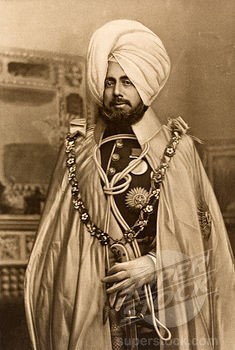Talk:The Dogra Hindu rulers of Jammū and Kaśmīra: Mahārājā Pratāp Siṅgh
By Vishal Agarwal
Unfortunately, a few years after Mahārājā Raṇjīt Siṅgh died, the British rulers invaded his empire and occupied it. They also took the Kohinoor diamond with them to England, where it is displayed even today to the visitors. They sold the regions of Jammū and Kaśmīra from his empire to a Hindu ruler of the Dogra dynasty. The Dogra rulers then invaded other areas and captured several parts of Tibet and the Muslim kingdoms to create a large kingdom of Jammū and Kaśmīra. In their kingdom, Hindus were once again able to practice their dharm without any harassment.
Below is a story from the life of a great Dogra ruler Mahārājā Pratāp Siṅgh that teaches that no matter how rich and powerful we become, we must never lose our faith in Hindu dharm.
Mahārājā Pratāp Siṅgh (1848–1925) of Jammū and Kaśmīra was a very religious Hindu king. Every day, he had brāhmaṇas perform various pūjās in his palace and gave charity to scholars. Some of his family members objected and said, “What is the use of wasting money on all these activities?” The Mahārājā replied, “By the blessings of Bhagavān, I have a lot of wealth. There are many other people in this world who too have a lot of wealth, but most of them use it for wasteful purposes. At least, I am doing something good with my money.”
The Mahārājā had utmost respect for the brāhmaṇas and cows. He got several temples constructed in his kingdom and banned the slaughter of cows. Once, he was walking on a street accompanied by many government officials. They saw a cow ahead, partially blocking the road. A courtier of the Mahārājā promptly rushed forward and chased the animal away. The Mahārājā was not pleased. He said, “I could have just walked around the cow. If Kṛṣṇa could roam barefoot in forests to take care of his cows, why can’t I just walk around a cow that is resting peacefully on the street? Henceforth, do not trouble the cow for my sake.”

